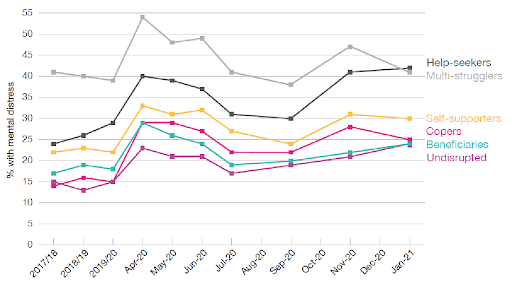
Isabel Taylor, Research Director, National Centre for Social Research
“Help-seekers and multi-strugglers”: Who felt the worst mental health and financial effects of the pandemic?
8 December 2021
When the COVID-19 pandemic hit the UK in early 2020, much of the country shut down to try to prevent people contracting and passing on the virus. This meant that the way we all lived and worked changed radically almost overnight.
While the UK government introduced a number of initiatives to try to reduce the worst consequences of the lockdown (including the furlough scheme, self-employment support grants and mortgage and rental holidays), it has become clear that the impact of the lockdown has hit some people particularly harshly.
Since summer 2020, the National Centre for Social Research (NatCen) has been working with the Money and Mental Health Policy Institute to explore the impact of the pandemic on people’s financial and mental wellbeing. Using data from Understanding Society (a large, UK-wide survey that has been collecting data at regular intervals since 2009), we have investigated how people’s financial situation has impacted their mental wellbeing since COVID-19 hit the UK.
This has included research into the impact of working from home and the furlough scheme on workers’ mental wellbeing. We have also used Understanding Society data, along with findings from focus groups with members of Money and Mental Health Policy Institute’s Research Community, to identify groups of people who have been particularly badly hit by the pandemic.
Who experienced the worst financial hit?
We identified six classes of people who had different financial experiences through the first six months of the pandemic. The finances of the two largest groups identified in this analysis were either unaffected or had improved, but two groups of people were particularly badly hit. “Help-seekers” were people who suffered income losses due to the pandemic and needed external financial support to cover these, while “Multi-strugglers” were people already in a precarious financial position at the start of 2020 who needed additional, non-work based financial support through the pandemic.
Mental distress increased across all groups of people after COVID-19 hit the UK, but both “Multi-strugglers” and “Help-seekers” were particularly badly hit. The “Multi-strugglers” group reported the highest levels of mental distress both before and during the pandemic, and this increased in April 2020 when more than half of “Multi-strugglers” reported significant mental distress.
In contrast, “Help-seekers” reported much lower levels of mental distress before the pandemic but experienced the biggest increase since then. By January 2021, “Help-seekers” were as likely as “Multi-strugglers” to report significant mental distress.
Proportion of respondents reporting significant mental distress by financial experience of the pandemic
Source: Understanding Society: Waves 1-10, 2009-2019 & Understanding Society: COVID-19 Study, 2020-2021

Understanding what’s driving increases in mental distress through the pandemic
To better understand the way individuals’ economic situation might be driving increased mental distress through the pandemic, we spoke to members of Money and Mental Health’s Research Community in focus groups, where we asked them to share their experiences of needing and accessing additional financial support.
Participants in these focus groups highlighted some of the practical reasons that may be contributing to increased distress. For example, self-employed people (who made up a third of the “Help-seekers” group) were required to complete a complex application process to access the government’s Self-employment Income Support Scheme. Participants told us this was difficult to navigate, and this was particularly the case among those experiencing mental health problems.
Furthermore, while the government announced a £20 uplift to Universal Credit, this was not extended to legacy benefits (such as Job Seekers Allowance, Employment Support Allowance or the Working Tax Credit). It is people who have been out of work for an extended period of time, including due to ill-health or disability, who are likely to be in receipt of these benefits. This created a feeling of injustice amongst some of the most disadvantaged participants in the focus groups, many of whom would be classed as “Multi-strugglers”.
No single solution will support everyone through the pandemic
While the COVID-19 pandemic has impacted the lives of everyone in the UK, it clearly has not affected everyone equally. Many people who were already struggling at the start of the pandemic were particularly badly hit; with half of “Multi-strugglers” reporting mental distress at the start of the pandemic. While some of the policies introduced, such as the furlough scheme – which has now ended – do appear to have offered a protective benefit to people who would have otherwise struggled more, there are still many who have experienced large increases in both financial and mental distress through the pandemic. People who were newly seeking financial support experienced a particularly large deterioration in their mental wellbeing, while many people with long-term financial difficulties continued to struggle.
As the financial consequences of the pandemic are likely to continue for some time, the financial and mental wellbeing of those worst hit by the pandemic cannot be ignored, both in the design and delivery of schemes to help these groups. Given the difficulties highlighted by members of Money and Mental Health’s Research Community, any continuing interventions for those most in need should be designed and implemented with people with mental health problems in mind.
This study was supported by the Economic and Social Research Council and UKRI: ES/V009877/1.
Data used:
- University of Essex, Institute for Social and Economic Research. (2020). Understanding Society: Waves 1-10, 2009-2019 and Harmonised BHPS: Waves 1-18, 1991-2009. [data collection]. 13th Edition. UK Data Service. SN: 6614, http://doi.org/10.5255/UKDA-SN-6614-14
- University of Essex, Institute for Social and Economic Research. (2021). Understanding Society: COVID-19 Study, 2020-2021. [data collection]. 8th Edition. UK Data Service. SN: 8644, http://doi. org/10.5255/UKDA-SN-8644-8
